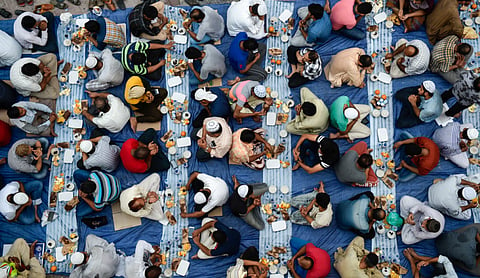UAE: 5.5 million free iftar meals
And the story behind it. Your time, dirhams or donations... every bit counts

Dubai
This Ramadan, the UAE is providing free iftar meals for over 5.5 million people (a conservative estimate) – that’s equivalent to feeding the entire population of Finland.
Government organisations, nonprofit charitable institutions, businesses and individuals are coming together to make sure everyone has a meal to look forward to, at the end of their fast.
One popular way to do this is by setting up tents across residential areas, usually in the vicinity of a mosque.
Dar Al Ber Society, one of the UAE’s oldest charities, has established 32 tents across all emirates.
Hisham Al Zahrani, deputy director of social service at Dar Al Ber Society, has been working with the organisation since 1999.
He said he has seen the number of iftar meals donated grow with each passing year, with 2017 seeing the highest volume of free meals given out so far.
Al Zahrani has a theory why this is happening.
He told Gulf News: “It is because of the occasion of the Year of Giving, under the directive of President His Highness Shaikh Khalifa Bin Zayed Al Nahyan, and because Ramadan is the month of giving. I appreciate all the effort taken by people to realise the UAE’s vision.”
When Dar Al Ber Society first started to give out iftar meals, they gave away 3,000 meals a day. Now, they provide 11,500 meals in Ramadan, every single day.
Al Zahrani said: “Our smallest tent accommodates 100 guests, while the largest has a capacity of 2,500 people. Anyone is welcome to come and have iftar in the tents, regardless of whether they are fasting or not, whether they are Muslim or not. This is part of the generosity of the month of Ramadan.”
The iftar meal comprises water, juice, milk, fruits, dates, a meat and rice dish like biryani, and often, a dessert.
The response to their free iftar meals initiative has been phenomenal.
Initially, Dar Al Ber Society’s Bur Dubai tent was ready to serve up meals for 1,100 people, but over 1,700 people arrived in the first few days, so they expanded their distribution.
Al Zahrani said: “We have many volunteers who work with our staff in making sure the meals are distributed on time, and everything is done properly. That is another aspect of the Year of Giving… everyone is trying to help, if not through their donations, then through their time, their careers, or by volunteering.”
Tahani Al Terri, manager of tolerance and happiness at Al Ihsan Charity Association in Ajman, said their organisation is aiming to provide 150,000 iftar meals this month.
She told Gulf News: “The beneficiaries of iftar meals are people who are fasting. We have more than 10 sites in mosques, and we distribute meals through tents set up in Ajman and Ras Al Khaimah, as well as through daily donations at the Association’s headquarters.”
The group also spearheads the Ramadan Aman initiative, which helps reduce the number of accidents by handing out iftar meals to drivers on the road and at traffic intersections before Maghrib prayers. They aim to give out 600,000 meals through this campaign.
Dubai’s Roads and Transport Authority (RTA) is taking part in the Ramadan Aman initiative too, but that’s just one of its many campaigns this month.
RTA’s Charity Bus initiative, in coordination with the UAE Food Bank, delivers iftar meals to commuters who travel by public transport.
Moaza Al Marri, director of marketing and corporate communications, said in a statement: “RTA deploys two buses to distribute 4,000 iftar meals, in collaboration with Beit Al Khair Society, to public transport riders in five bus stations and four metro stations.”
They also have plans to distribute charitable supplies to 400 disadvantaged families in Hatta and other areas of Dubai, while celebrating Zayed Humanitarian Day, which falls on the 19th of Ramadan.
Another organisation, the Easa Saleh Al Gurg Charity Foundation in Dubai, has plans to distribute up to 100,000 free iftar meals to mainly blue-collar workers, this month.
But it isn’t just government or charitable organisations that are taking the lead. The UAE community is rallying together to volunteer or help provide meals.
Around 542 Emirati families are participating in the Iftar Saem initiative, through which, 55,200 iftar meals are distributed daily at 100 locations around the UAE. The initiative is part of a Ramadan drive by the Khalifa bin Zayed Al Nahyan Foundation in Abu Dhabi.
The Emirates Foundation’s Takatof programme, the nation’s largest youth volunteerism network, has organised nine iftar areas this year, spread across the emirates.
An Emirates Foundation official told Gulf News: “On average, each iftar hosts 150 people, mostly labourers and needy families. It is organised by 30 volunteers who set up the iftar, serve the guests and also eat with them.”
With the hashtag #Letsmakeitcount, Takatof’s campaign aims to mobilise 1,700 volunteers from across the UAE, with a total of 15,000 volunteering hours during Ramadan.
The sight of people setting out iftar meals is a common one, at mosques around the UAE.
One such site that successfully pulls off the logistics of hosting a daily iftar for over 30,000 people, is the Shaikh Zayed Grand Mosque in Abu Dhabi.
Their kitchen works around the clock to prepare the UAE’s biggest iftar every evening in Ramadan, and the operation involves 350 chefs, 450 service staff and 160 stewards.
Gulf News readers on our Facebook page also highlighted over 20 different neighbourhoods across the emirates, where anyone can approach a mosque at iftar for a wholesome meal.
M. Hussain Patav, a Dubai resident, wrote on Gulf News’ Facebook page: “There is a Ramadan tent at every major mosque in Dubai, such as the one in Hor Al Anz. I think the UAE is the best place to see large iftar arrangements during the holy month.”



